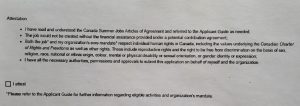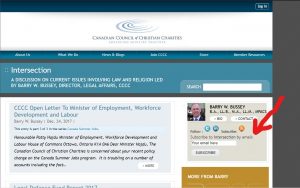- Summer Jobs Program: Further Evidence of The Government of Canada’s Ideological Approach Toward Religious Charities
- Bussey on ipolitics.ca: Trudeau, Trinity Western and the war on religious dissent
- CCCC Open Letter To Minister of Employment, Workforce Development and Labour
- Important Notice about the Canada Summer Jobs Program
- Agree with Abortion or Lose Government Funding! Watch Intersection
- BREAKING NEWS: Government has issued more information on the CSJ Program
- CCCC’s Response To Government’s Supplementary Information on CSJ
- BREAKING NEWS: Live News Conference from faith leaders on Canada Summer Jobs issue
- RELIGIOUS COMMUNITIES CALL ON GOVERNMENT TO REMOVE ABORTION ATTESTATION REQUIREMENT
- Federal Court Refuses Injunction On Canada Summer Jobs
- Government Extends the Canada Summer Jobs Deadline to February 9
- CCCC’s Recommendation in Response to Government Rejections of CSJ Applications
- What the fuss about ticking a box on the Canada Summer Jobs application is about
- URGENT: Watch Live Now Debate at the House of Commons
- Parliament to Vote on March 19 on the Canada Summer Jobs Program
- Canada Summer Jobs Motion is Defeated But The Issue Remains Very Much Alive
- Bussey Op-Ed: Keep your money. Our religious conscience is worth far more.
- Minister Hajdu Says No to Changes This Year
- Minister Hajdu Says No to Changes This Year
- Canada Summer Job Program Heats Up in Time For Summer
- We Need Your Financial Help to Support Litigation Against the Government of Canada’s Violation of Freedom
- BREAKING NEWS on Canada Summer Jobs
- The government finally blinks on the summer jobs attestation — or so it seems
- To Apply or Not to Apply for Canada Summer Jobs Funding?
- 2019 Canada Summer Jobs Update
- Canada Summer Jobs 2020 – Applications Open!
- Canada Summer Jobs 2020: Approvals Now Available
- Canada Summer Jobs 2021: Applications Open
- A Win for Religious Organizations Challenging Canada Summer Job Rejections
- Canada Summer Jobs 2022
Attn.: Christian Charities in Canada
- If you have received funding in the past but in 2018 it is denied because of your refusal to accept the government’s attestation, please email (mail@cccc.org) or call (519-669-5137) us at the CCCC office as to the next steps.
- Please keep us informed as to the success of your application for a Canada Summer Jobs program grant for 2018. We want to keep track of the actual experience that our members have with this program.
We have received many emails and phone calls about this issue in recent days and felt it necessary to respond to the common questions we are getting to assist as many as possible.
Canada Summer Jobs Update: Questions and Answers

Q: What is all the fuss about the Canada Summer Jobs program?
A: As the Christian community prepared for the Christmas season, the Canadian public was notified of the Government’s new policy regarding the Canada Summer Jobs (CSJ) program. The policy requires employers to attest that:
both the job and the organization’s core mandate respect individual human rights in Canada, including the values underlying the Canadian Charter of Rights and Freedoms as well as other rights. These include reproductive rights and the right to be free from discrimination on the basis of sex, religion, race, national or ethnic origin, colour, mental or physical disability, sexual orientation or gender identity or expression.
The employer attestation for CSJ 2018 is consistent with individual human rights in Canada, Charter rights and case law, and the Government of Canada’s commitment to human rights, which include women’s rights and women’s reproductive rights, and the rights of gender-diverse and transgender Canadians.
The government recognizes that women’s rights are human rights. This includes sexual and reproductive rights — and the right to access safe and legal abortions. These rights are at the core of the Government of Canada’s foreign and domestic policies.
The government recognizes that everyone should have the right to live according to their gender identity and express their gender as they choose, free from discrimination. The government is committed to protecting the dignity, security, and rights of gender-diverse and transgender Canadians.
The objective of the change is to prevent Government of Canada funding from flowing to organization whose mandates or projects may not respect individual human rights, the values underlying the Charter of Rights and Freedoms and associated case law. This helps prevent youth (as young as 15 years of age) from being exposed to employment within organizations that may promote positions that are contrary to the values enshrined in the Charter of Rights and Freedoms and associated case law.
You will note that this new policy is vague. There is considerable debate about the meaning of “Charter values”. Even the Supreme Court of Canada has yet to provide a clear unequivocal statement as to what such “values” mean in relation to Charter rights. (See Barry W. Bussey, “The Charter Is Not a Blueprint for Moral Conformity,” https://papers.ssrn.com/abstract=3032525, especially the section “Charter ‘Values’: A Poor Substitute For Law,” at page 393-411)
One justification of the policy is that it is meant to protect the youth from “exposure” to organizations that promote ideas contrary to Charter values. This is a troubling characterization of organizations that do not adhere to the government’s positions on such issues as abortion and sexuality.
For example, many Christian organizations, such as churches and summer camps, hold a pro-life, pro-traditional marriage position. A literal reading of this policy would prevent churches, summer camps, soup kitchens, and many other Christian and religious charities from having access to the Canada Summer Jobs program.
Q: Is CCCC taking action in terms of formally responding to the federal government?
A: Yes, CCCC has expressed its concern with the policy through its blog and op-ed writing. CCCC has also written a letter of concern to Honourable Patty Hajdu, Minister of Employment, Workforce Development and Labour.
Additionally, CCCC is networking with a group of lawyers, church leaders, and other concerned individuals from across Canada to consider the appropriate response to this government policy.
Q: What can churches and charities do to voice their concern?
A: Pray, express concern, contact MPs.
- First, pray for wisdom to do and say the right thing. We must continue to express our views in a spirit of peace, speaking truth in love.
- Second, express your concern to government through all the avenues open to you – by letter, email, social media, etc. Charities, including local churches, have every right to voice their concerns to government about the new policy. Doing so does not violate CRA guidelines about registered charities’ expressing their opposition to government policy that affects their charitable operations. It is important to be respectful yet clearly express why this new policy will have a negative impact on your organization.
- Contact your MP; doing so is important and effective. As we saw in Fall 2017, when the government planned to remove s.176 from the Criminal Code, the constant pressure applied to government saw them change their mind. The same could work here.Every Canadian ought to be troubled by this development. To make government benefits subject to agreement with government ideology is beyond anything we have seen in our history. To see this being done so blatantly is unprecedented.If you don’t know who your MP is, find that person here.
Q: Should we apply for a CSJ grant for 2018?
A: Absolutely. You will find that when you apply online and check the “no” box on the attestation, your application will be voided. Therefore, I recommend that you use the paper process.
The paper process allows you to put in the margin a note describing your position and interpretation of the attestation requirement.
If you decide to apply, check the box “I attest” so that you are in agreement with the general attestation, but then use the margin, next to the third bullet, cross out that third bullet and write “see attached letter” or “see attached attestation” explaining why you cannot attest to that bullet point. (See the sample attestation below).
When you look at the Attestation at paragraph 22 of the Application Form there is not a place to check “no” to the the specific concern that you have regarding the core mandate and Charter rights (which is bullet three of the Attestation). When you “Attest” you are attesting that:
- you have read and understood the CSJ agreement etc.
- the job would not be created but for the CSJ grant etc.
- both the job and core mandate respect human rights etc. (This is the problem one.)
- you have all the authorities and permissions etc.

It seems to me that Christian organizations could, with a clear conscience, indicate an assurance that they do comply with all Charter obligations and Human Rights legislation in Canada. That is the law in any event. The law, as it currently stands, supports religious communities to self-define their community.
Human rights legislation provides Bona Fide Occupational Requirements (BFOR). BFOR grant religious organizations the ability to associate and choose their community, which includes the right to hire employees who are in keeping with the religious mission/obligations of the organization.
Here is an attestation that has been used by other organizations in their paper filing that you may choose to use (or amend as below) in your application:
On the basis of conscience, we are unable to express the words that the Minister has required in the Applicant’s Guide. We are, however, able to attest that “we support all Canadian law, including human rights law.” We believe the Minister does not have the jurisdiction under law to compel us to make a statement that conflicts with our conscience rights under the Charter. Nor does the Minister have the right to compel speech as a condition of receiving a financial benefit from the government of Canada. We respectfully decline to make a statement that is inconsistent with our fundamental personal beliefs about the value of life and the right to life under section 7 of the Charter. Please confirm that you will accept our application with the above-noted statement in substitution for the statement set forth in the online application process and in the Applicant’s Guide.
Please feel free to make this sample attestation applicable to your organization. For example, you may want to amend it as below:
On the basis of religious conscience, we are not prepared to express the words that the Minister has required in the Applicant’s Guide. We attest that we are committed to upholding our obligations under all Canadian law, including human rights law. We believe the Minister does not have the jurisdiction under law to compel someone to make a statement or adopt a belief, especially one that conflicts with our religious conscience under the Charter as a condition for receipt of funding. Nor does the Minister have the right to compel speech as a condition of receiving a financial benefit from the government of Canada. We respectfully decline to make a statement that is inconsistent with our fundamental constitutionally protected personal beliefs including those about the value of life and the right to life under section 7 of the Charter, and about the freedom of religion as guaranteed in s. 2(a). Please accept our application with the above-noted statement in substitution for the statement set forth in the online application process and in the Applicant’s Guide.
When you send in your application, send it by registered mail so that the government has to sign that they received the documentation.
Q. Who is focused on protecting the churches and Christian charities of Canada’s charitable status?
A. You can be assured that CCCC is committed to doing all that we can to ensure that there is a favourable legal environment in which Christian charities in Canada can operate. Such an environment includes maintaining the charitable status of churches and other religious charities in Canada.
Q. How can we collectively rally together to have a singular voice against this obvious attack on religious freedoms?
A. With each crisis, the Christian community is coming together and pooling resources to ensure that we have an effective response. We, along with other Christian ministries, are meeting to discuss this very thing. It may well be that it is best for us to maintain our respective voices but come together publicly in moments like this. Thank you for your continued support.
Q. How can we keep informed on these developments?
A. I encourage you to subscribe to our Intersections Blog by adding your email to our list. (Be sure to have ONLY your email address with no extra spaces or it will not work). Then you will need to confirm your subscription by clicking on the link in your Inbox.




Thank you for this article. Am I correct that the sample attestation focuses mostly on personal conscience rights? Do you think an organization such as a church might rather, or in addition, focus on religious rights under the charter? What would you suggest? Also, does the sample attestation intentionally only mention pro-life issues rather than also focusing on a church’s right to hold and promote Biblical sexual morality?
Hi Brad, yes the attestation was used by those particularly concerned with the pro-life and conscience. This can also be crafted for religious freedom. We will work on something and add it to our post. Thanks Barry
I appreciate the suggested wording for the margin of the form and as the previous person noted in his comments, any more general wording to address the issue from an organization perspective would be helpful though I could likely adapt from what is there. Thanks for your work in this area!
Has anyone explored the legal implications of “including the values underlying the Canadian Charter of Rights and Freedoms (Charter) as well as other rights.”
It sounds to me like they are demanding that people not only agree with the Charter, but also with the values (undefined) that precede the Charter, and “other rights” (unidentified) that fall under the category of “other”.
Very poorly written and legally vague. I would think anyone would have trouble signing a document that includes agreement with “other stuff”.
Hi Tom, this is certainly a concern that I have noticed. I agree – it is so vague it is unworkable and something that a government should have vetted before posting. It still baffles me that this would be posted when the Charter is not any citizen’s responsibility but the government. We as citizens have a responsibility to ensure that the government is not operating outside of the Charter. The cart is before the horse on this one…
As someone who received over $123,000 in the last 2 summers, Bramalea Baptist church in Brampton created 45 student job opportunities, this will dramatically change the way we invest and build up our young leaders.
I have seen many students learn and grow as a result of this program and also use their talents and skills to impact each other and the kids.
We can still run the ministries, but the encouragement and development of our student staff and their opportunities to save money for post secondary education will be affected.
We sent in our grant by paper & registered mail but changed the wording in the attestation!
Thanks for the advice in the midst of the confusion, we can only try to navigate this “first time” as precedent is set
Thanks Beverley. May I encourage you to contact your local media and let them know why you could not agree with the attestation and what the community would lose if you cannot hire students this summer if you are not given funding. See my latest blog where I interviewed Bruce Clemenger. All the very best in your application!
Though we as a family are still learning about al the implications, my understanding is that there is a similar statement that needs to be signed by student applicants that are benefiting from the Canada Summer Jobs program. My oldest son benefitted and had a good experience last year through this program.
Is there there any guidance available for the students?
Thanks for this heads up. I am not family with individuals having to sign such a statement. Please keep us informed on such a requirement.
Looks like the government has come out with clarifications for this. https://www.canada.ca/en/employment-social-development/services/funding/canada-summer-jobs/supplementary-information.html Although it does clarify one thing – that you can still sign off on the attestation while still carrying our religious beliefs – it does mention other examples where some organizations would not be eligible (not hiring based on orientation, traditional marriage, etc.)
I’m wondering if there is legal precident for Bona Fide Occupational Requirements for things like: Orientation, traditional marriage, sexual purity, etc. If there is, then would Christian Organization’s then be able to sign off, with a clear concience, attesting to the statement because we do respect human rights and charter rights which also includes our BFOR’s.
Such a challenging situation we find ourselves in these days.
Hi Rob,
Human rights legislation does provide for BFOR in religious organizations. Your question is a good one – there is some confusion as to how government will interpret the attestation requirement even in light of their “supplementary information.” On my reading of it the government is wanting the religious organizations to forego their human rights legislation protections and accept the government’s view of “discrimination”. That makes it very difficult to agree to the attestation.